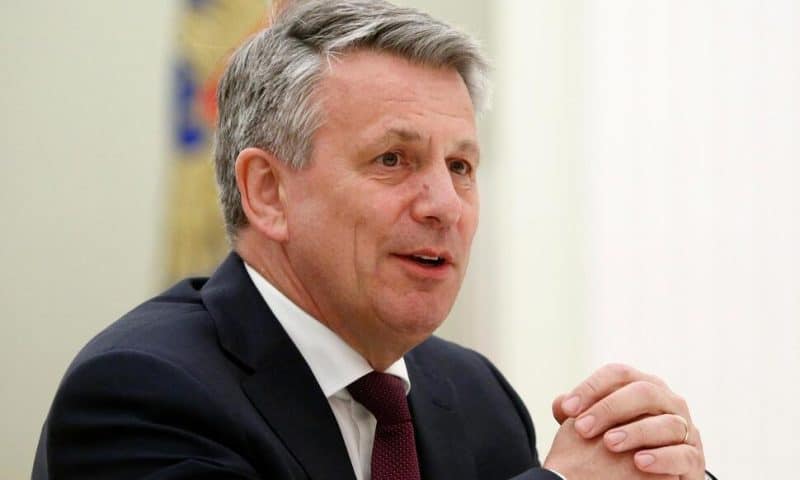Shell CEO Ben van Beurden is stepping down at the end of 2022 after nine years in charge as oil and natural gas companies are under pressure to shift away from fossil fuels.
LONDON — Shell CEO Ben van Beurden is stepping down at the end of 2022 after nine years in charge, the energy giant said Thursday, a change that comes as oil and natural gas companies are under pressure to shift away from fossil fuels even as they see soaring profits from energy prices driven up by Russia’s war in Ukraine.
Taking over Jan. 1 is Wael Sawan, a Lebanese-Canadian who has worked for Shell for 25 years and is now director of integrated gas, renewables and energy solutions. The choice signals the focus of the London-based company to take what it calls a leading role in the energy transition despite facing criticism that it’s been slow to reduce climate-changing emissions.
“I’m looking forward to channeling the pioneering spirit and passion of our incredible people to rise to the immense challenges, and grasp the opportunities presented by the energy transition,” said Sawan, who has been a member of Shell’s executive committee for three years.
He takes over at a tumultuous time for Shell and other oil and gas giants. While the world is looking to transition to renewable sources like wind and solar, the war in Ukraine has created volatility that has driven up energy prices and fueled inflation.
Natural gas prices have soared as Russia has curbed supplies to Europe, where an energy crisis is forcing governments to institute conservation measures and go back to coal and oil despite climate goals to ensure the lights stay on this winter.
Volatile oil prices soared above $120 per barrel in June, pushing gasoline prices at the pump to record highs in the United States. Crude has since fallen below $90.
That has translated to record profits for energy companies at a time when households and businesses are getting stung by rising costs. Some European governments have approved taxes on excess profits of energy companies to help households and businesses, and the European Union’s executive Commission proposed Wednesday a similar levy on electricity producers across the 27-nation bloc.
In late July, Shell posted record profits of $11.5 billion for a second straight quarter. That was up from $5.5 billion in the same three-month period last year, despite a hit worth billions from pulling out of Russia over the invasion of Ukraine.
Ellen Wald, the founder of energy consulting firm Transversal Consulting, notes that prior to heading natural gas and renewables, the incoming CEO was involved in the company’s upstream operations. Despite efforts by Shell to shift toward more renewables, the company still makes most of its money selling and trading crude oil, Wald said.
“It’s not like he’s just a renewable guy,” Wald said. “He’s still an oil and gas person, but I do think the fact that he was in this (renewables) division before moving to CEO shows how integral they see this to the future of the company.”
Shell Chairman, Sir Andrew Mackenzie, called Sawan “an exceptional leader, with all the qualities needed to drive Shell safely and profitably through its next phase of transition and growth.”
Sophie Lund-Yates, a lead equity analyst at Hargreaves Lansdown, an investment services firm, called Sawan’s appointment “a clear marker” that Shell intends to make its renewable strategy clearer, even if “change won’t happen overnight.” He “won’t be ignorant to the fact oil prices can collapse at short notice” and that is “all but guaranteed to be something he’ll have to navigate,” Lund-Yates added.
Formerly known as Dutch Royal Shell, the company late last year left the Netherlands and consolidated its headquarters in London as it simplified its archaic corporate structure. Shell has resisted pressure to break itself up, with one company focused on renewable energy and the other on legacy fossil fuels, as other firms have done.
It has a goal of reaching net-zero carbon emissions by 2050 by investing in renewable energy, restoring forests and taking other steps but has been accused of moving too slowly.
Last year, the Hague District Court ordered Shell to cut carbon emissions 45% by 2030, saying the company’s net-zero target “is not concrete, has many caveats and is based on monitoring social developments rather than the company’s own responsibility for achieving a CO2 reduction.”
“It’s a tricky position for these European legacy energy companies because they face an immense amount of pressure to basically get out of their core business, and yet there’s still demand for their core products—a lot of demand for it,” Wald said.

